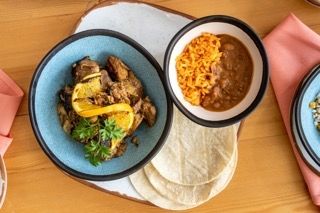Taste passion in every dish served at New York Times rated dining venues
Is Mexican Food Healthy? Unpacking the Nutritional Benefits of Conventional Components
The concern of whether Mexican food is healthy and balanced invites an expedition of its conventional ingredients. Beans and corn serve as foundational staples, rich in protein and fiber. Avocados provide useful fats, while various herbs and spices include taste and health and wellness advantages - freshly made guacamole. Together, these elements develop a tapestry of nutrition. Nevertheless, the healthfulness of Mexican food commonly depends upon prep work approaches and portion sizes. What function do these variables play in determining its total nutritional worth?
The Power of Beans: Protein and Fiber-Rich Staples
Typically neglected, beans offer as a foundation of Mexican cuisine, supplying a wealth of dietary advantages. Rich in protein, they are an outstanding plant-based alternative for those looking for to fulfill their dietary protein needs. This high healthy protein material sustains muscle mass repair work and growth, making beans vital for both meat-eaters and vegetarians alike. Furthermore, beans are an outstanding resource of dietary fiber, which helps in food digestion and promotes a sensation of fullness, potentially aiding with weight management.
The selection of beans used in Mexican recipes, such as black beans, pinto beans, and kidney beans, adds to a varied taste profile and can boost dishes nutritionally. Beans are reduced in fat and consist of essential vitamins and minerals, including magnesium, iron, and folate. Together, these characteristics make beans a vital ingredient, providing both nourishment and sustenance in traditional Mexican price.

Corn: a Versatile Grain With Nutritional Perks
Corn stands apart as a versatile grain fundamental to Mexican cuisine, celebrated not only for its cooking applications however additionally for its outstanding dietary account. As a primary ingredient in meals like tortillas, tamales, and pozole, corn supplies necessary nutrients that add to a well balanced diet regimen. Rich in carbs, it works as a significant energy resource, while additionally being low in fat, making it a beneficial option for various dietary needs.
Corn is a good source of nutritional fiber, which aids in digestion and advertises satiety. It contains considerable amounts of vitamins such as B-complex vitamins, which are important for power metabolic rate. The existence of anti-oxidants, especially carotenoids, contributes to overall health and wellness by minimizing oxidative stress and anxiety. In addition, corn is gluten-free, satisfying those with gluten level of sensitivities. Generally, the nutritional benefits of corn underscore its value in conventional Mexican food and its duty in a healthy and balanced diet regimen.
Avocados: Healthy And Balanced Fats and Nutrients in Every Bite
Avocados play a significant role in Mexican food, matching dishes with their creamy texture and abundant taste. Past their culinary appeal, avocados are commemorated for their outstanding dietary profile. They are a rich resource of healthy and balanced monounsaturated fats, which can help lower negative cholesterol degrees and support heart health and wellness. Furthermore, avocados are loaded with crucial minerals and vitamins, consisting of potassium, vitamin E, and B vitamins, adding to general wellness.
The high fiber material in avocados aids food digestion and promotes satiation, making them a beneficial enhancement to any dish. Their distinct nutrient composition can also support skin health and wellness and supply anti-inflammatory benefits. Including avocados into conventional Mexican recipes or appreciating them as a standalone treat can enhance both flavor and nourishment, demonstrating why they are a cherished staple in Mexican cuisine. In general, avocados supply a delicious way to take pleasure in healthy and balanced fats and crucial nutrients in every bite.

Natural Herbs and spices: Flavorful Health And Wellness Boosters
While enjoying the abundant flavors of Mexican food, one can not forget the necessary duty that spices and herbs play in enhancing both preference and health and wellness. Active ingredients such as chili, oregano, and cilantro peppers not only add to the dynamic taste profile however additionally offer considerable health advantages. As an example, cilantro is known for its detoxifying homes, helping to remove heavy metals from the body, while oregano is packed with antioxidants and possesses anti-inflammatory effects.
Chili peppers, a staple in numerous Mexican meals, include capsaicin, which has been linked to improved metabolism and discomfort alleviation. Furthermore, flavors like cumin and coriander support food digestion and might assist in blood glucose guideline. Integrating these flavorful health boosters right into meals not only boosts the cooking experience however also promotes total wellness, making Mexican cuisine not simply tasty, however also nutritionally advantageous.
Typical Food Preparation Methods: Enhancing Nourishment and Flavor
Typical food preparation methods in Mexican food play a crucial function in enhancing both nourishment and flavor, as they frequently focus on time-honored strategies and fresh ingredients. Strategies such as nixtamalization, where corn is soaked and prepared in an alkaline option, not only boost the nutrient profile of tortillas however also enhance their digestibility - freshly made guacamole. In addition, the use of slow-moving cooking techniques, like cooking or braising, allows tastes to blend wonderfully while preserving the integrity of the components

Often Asked Concerns
Are Mexican Food Portions Generally Larger Than Various Other Foods?
Mexican food portions are usually larger than those of many various other cuisines. This particular reflects typical dining techniques, highlighting communal sharing and hearty dishes, which can lead to an extra substantial offering size on the whole.
How Does the Prep Work Technique Affect Healthiness of Mexican Food?
Preparation techniques greatly influence the healthfulness of Mexican food. Techniques such as cooking or steaming preserve nutrients, while frying can increase undesirable fat content. Options of active ingredients and cooking styles inevitably determine general nutritional worth.
Can Mexican Food Be Tailored for Certain Nutritional Restrictions?
Mexican food can undoubtedly be customized for specific dietary limitations. Substitutions, such as utilizing corn tortillas for gluten-free diet regimens or including more vegetables, allow people to appreciate conventional tastes while suiting various nutritional requirements.
What Are Usual Mistaken Beliefs About Mexican Food and Health And Wellness?
Usual misconceptions about Mexican food include the belief that it is inherently undesirable, excessively zesty, and exclusively concentrated on fats. Actually, traditional dishes typically feature healthy components and can be customized to numerous dietary needs.
Are There Healthier Options at Mexican Restaurants?
Much healthier alternatives at Mexican dining establishments typically consist of barbequed meats, beans, and fresh vegetables. Selecting meals that highlight whole ingredients and avoiding hefty sauces can cause an extra healthy dining experience, promoting overall well-being.
The selection of beans made use of in Mexican meals, such as black beans, pinto beans, and kidney beans, contributes to a varied taste profile and can enhance dishes nutritionally. Avocados play a substantial duty in Mexican cuisine, complementing meals with their velvety structure and rich taste. Integrating avocados into traditional Mexican recipes or appreciating them as a standalone snack can enhance both flavor and nourishment, demonstrating why Learn More they are a beloved staple in Mexican food. While enjoying the abundant flavors of Mexican cuisine, one can not neglect the important role that spices and natural herbs play in improving both taste and wellness. Standard cooking approaches in Mexican cuisine play a crucial function in enhancing both nourishment and flavor, as they often focus on fresh components and time-honored methods.